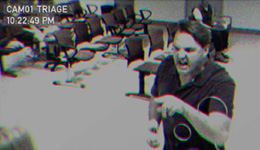PDF 114 KB
Fact sheet on what SA Health is doing regarding challenging behaviour relating to patients, consumers, carers, volunteers and staff
 In the Emergency Department lives depend on us treating the people who need it most, first. If your condition is less critical you will be cared for, but may have to wait a little longer. While that can be frustrating, turning it into another emergency isn’t helping anyone.
In the Emergency Department lives depend on us treating the people who need it most, first. If your condition is less critical you will be cared for, but may have to wait a little longer. While that can be frustrating, turning it into another emergency isn’t helping anyone.
If there is one single point of convergence for every aspect of patient care, it is the Emergency Department (ED).
Challenging behaviour infographic (PDF 452KB)
Here, patients in need of every possible type of care can present at the one time. Most are unfamiliar with ED protocol. They are intimidated by the environment and perceived lack empathy. Managing all of these different medical and emotional needs simultaneously can be extremely demanding for staff, and the pace is relentless.
In this pressure cooker environment there are many dynamics at play that can lead to instances of challenging behaviour. Extended waiting times, anxious patients and besieged staff, are all susceptible to experiencing or exhibiting the full spectrum of challenging behaviour.
Yes, sometimes on the job our staff face verbal abuse, threats of intimidation and violence, being spat on, through to physical assault such as kicks, bites and punches.
Emergency Departments across SA have seen an increase in these types of incidents, it is becoming more frequent.
This can be distressing not only for our staff but for other patients and carers within the ED too.
Challenging behaviour can commonly present with patients who:
Further information can be found in the fact sheet (PDF 114KB) on how challenging behaviour commonly presents and the causes of this behaviour.
Everyone deserves to be able to come to work without having to deal with verbal abuse, threats of intimidation or physical assault. This includes all of our health care workers, whose job it is to care for us all.
The impact of challenging behaviour, such as verbal abuse is accumulative. The innuendo, derogatory or offensive remarks, insults, overt displays of aggression, and are all too often mediated by compassion for the patient's circumstances. The acts frequently go unreported, or are simply tolerated as 'part of the job'. Over time this contributes to staff attitude, low morale and diminished self-worth.
Respect our ED staff because they're here to help. Make it socially unacceptable amongst your peers to be disrespectful, threaten or harm a health care worker.
Talk with younger members of your family to educate them about the important role health care workers play and how we should always treat them with respect in case we need their help.